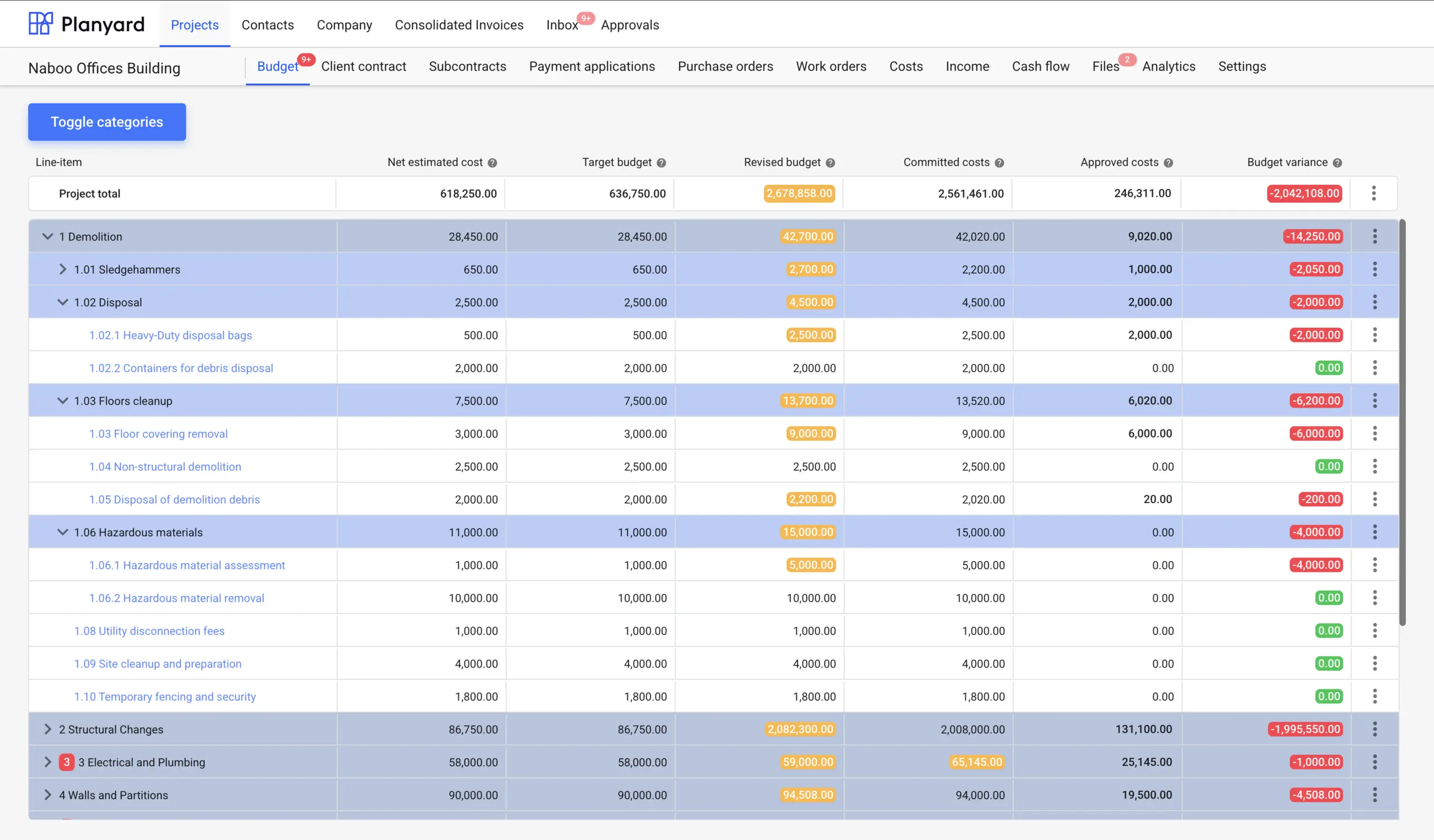Planyard byggestyringsprogramvare er designet for å effektivisere prosjektøkonomistyring. Den er bygget spesielt for byggebransjen som en enkelt kilde for dataregistrering, noe som gjør det enklere å følge kostnader, administrere budsjetter og ha nøyaktige prosjektlønnsomhetsprognoser.
Forenkle ditt byggeregnskap
Planyard er ideell for små og mellomstore byggeteam som ønsker å erstatte regneark, effektivisere kostnadskontroll, forbedre prognoser og fremme forretningsvekst.
Ingen duplisert dataregistrering. Registrer én gang, synkronisert overalt.
Gratis 14-dagers prøveperiode med alle funksjoner. Ingen kredittkort nødvendig.

Nøkkelfunksjoner i Planyard
Planyard tilbyr fleksibilitet og brukervennlighet for voksende team, med avanserte funksjoner som underleverandørbudgivning og fremdriftsbetalinger for større virksomheter.
Designet av byggeprofesjonelle for å gjøre arbeidslivet enkelt
Ingen duplisert dataregistrering — én sannhetskilde for alle prosjektkostnader. Det er designet for både ledelse og prosjektteam for å administrere prosjektøkonomi på ett sted og i sanntid.
Gratis 14-dagers prøveperiode med alle funksjoner. Ingen kredittkort nødvendig.

Planyard integreres med de mest populære regnskapsverktøyene.
Hold økonomien på rett spor og spar tid
Hvem er Planyard for?
Enten du administrerer små renoveringer eller store byggeprosjekter, hjelper Planyard deg med å effektivisere prosessene dine og forbli lønnsom.
Voks virksomheten din ved å standardisere økonomien din
Hold prosjekter lønnsomme
Se sanntids prosjektkostnader og prognoser for å ta raske beslutninger og unngå overskridelser.
Fokuser på det som betyr noe
Dropp regnearkene, kutt duplisert dataregistrering, og la teamet ditt fokusere på det som betyr noe.
Én enkel måte for alle
Raskt trene og onboarde nye ansatte, og la alle administrere prosjektene sine på samme måte.
Gratis 14-dagers prøveperiode med alle funksjoner. Ingen kredittkort nødvendig.
Les suksesshistorier fra kundene våre
Se hvordan Planyard hjelper bedrifter som din med å lykkes - les historiene deres i bloggen vår.
"Planyard's integration with Xero has streamlined our project financials, providing clear insights and saving us valuable time. It's easy to use and keeps all commitments organized for seamless financial tracking."
Les mer om dette"Planyard is basically a live CVR and saves time by making Excel unnecessary. Once a project’s set up, I can rely on Planyard to stay organized without spreadsheets."
Les mer om dette"If there’s some problem with the budget, it just tells you what you need to fix and you’ll be fine. It really just kind of thinks a step ahead for you."
Les mer om dette"Planyard saves us 3-4 days per project by simplifying financial tracking and cutting out double data entry. It’s user-friendly and lets us focus on our main tasks."
Les mer om dette"Planyard is exactly what I’m after as a business owner: a good-value system that keeps everything in one place, saves me money and makes sure I’m not losing any money on projects. As a businessman, that’s a no-brainer."
Les mer om dette"I’m confident that we can manage multiple projects effectively. We’re currently running three fairly large ones, and the system makes it very clear and easy to manage all of them at once."
Les mer om dette"I chose Planyard because it stood out as the most straightforward and intuitive option on the market. I really wanted a tool that would simplify our existing processes and make everything more efficient, rather than switching to a system that was far too complicated for us to use on a daily basis."
Les mer om dette"Planyard has completely replaced my CVR process. Cost Value Reconciliation is essentially about tracking your budget against your actual spend to see exactly what remains, and that functionality is the absolute essence of the central core of Planyard."
Les mer om dette"For me Planyard is essentially the go to software for SMBs. There are other software packages out there that are a large investment upfront with a significant monthly cost. These are all potential solutions once you get to a very large business but they are not a solution for SMBs."
"Timewise, on a single project, I'd probably save 6 to 8 hours—essentially a full day every month. When it comes to processing monthly payments, it saves me a solid day, perhaps even a day and a half, just in sorting through the invoices. Saving a day and a half of my time means the system pays for itself time and time again."
Les mer om detteOfte stilte spørsmål
Vi har svar på spørsmålene dine. Hvis du ikke finner svaret nedenfor, er du velkommen til å kontakte oss via chatten.
Planyard henvender seg til ulike byggeinteressenter, inkludert hovedentreprenører, utviklere og underleverandører. Den tilbyr pakker for virksomheter av alle størrelser – fra oppstartsselskaper til større selskaper med etablerte prosesser.
For eksempel kan du starte med Professional-pakken og oppgradere funksjonssettet når dine behov eller teamstørrelse vokser. Ultimate-pakken har funksjoner som enhver større entreprenør kan trenge – underleverandørtilbud, underleverandør fremdriftsrapportering og endringsordrer.
Planyard hjelper byggefirmaer med å adressere vanlige smertepunkter som:
- Prosjektdata delt i for mange regneark.
- Mangel på synlighet i prosjektøkonomi.
- Tidskrevende manuell dataregistrering og kostnadssporing.
- Vanskeligheter med å vurdere prosjektlønnsomhet.
- Ineffektivitet i underleverandørstyring.
- Utfordringer med å følge forpliktelser og prognoser kontantstrøm.
Planyard integreres sømløst med dine eksisterende arbeidsflyter for å sentralisere økonomiske data og prosjektstyring. Kort sagt fungerer Planyard som følger:
- Last opp prosjektbudsjettet.
- Tildel det til den ansvarlige prosjektlederen eller mengdeberegneren.
- Reis bestillinger og godkjenn kostnader i Planyard.
- La Planyard sende kostnadsdokumenter med kontekst til ditt regnskapsprogram.
- Unngå overraskelser i ditt neste kostnadskontrollmøte.
Ja! Planyard er skybasert, så du trenger ikke en kompleks oppsett med en lokal server. Bare registrer deg for en konto og onboard prosjektene dine. Implementeringen tar vanligvis bare noen timer. Du kan trenge en videosamtale med vårt kundesukses-team for å sette opp alt hvis du har noen åpne spørsmål.
Ikke med mindre du trenger vår støtte. Du kan sette opp Planyard selv, inkludert å koble til ditt regnskapsprogram. Hvis du har mer komplekse arbeidsflyter du ønsker støtte med, tilbyr vi betalte onboarding-pakker.
Ja, Planyard integreres med populære regnskapsprogrammer som Xero og QuickBooks. Dette sikrer en jevn dataflyt mellom prosjektstyring og regnskapssystemer, reduserer feil og sparer tid.
Ja, Planyard tilbyr en gratis prøveperiode slik at du kan utforske funksjonene og se hvordan det passer dine behov før du forplikter deg. Klikk her for å registrere deg for den gratis prøveperioden.
Ja, Planyard støtter flere språk for å imøtekomme en mangfoldig brukerbase over hele verden. Hvis du har spesifikke språkkrav, kontakt Planyards kundestøtte for mer informasjon.
For mer informasjon kan du:
- Registrer deg her for en gratis prøveperiode og test det ut selv.
- Kontakt Planyards supportteam direkte via chatten på nettstedet.
- Bestill en demo for å se hvordan Planyard fungerer for dine spesifikke behov.
Last opp prosjektbudsjettet ditt og følg den økonomiske fremdriften i sanntid
Ingen kredittkort kreves. Ingen salg eller IT-støtte nødvendig.
Last opp startbudsjettet for prosjektet og tildel det til prosjektlederen eller mengdeberegneren
Hjelp teamet ditt med å raskt mestre Planyard ved å se våre 5-minutters arbeidsflytvideoer
Bruk Planyard Treningsprosjektet for å utforske og få praktisk erfaring med systemet
Få mest mulig ut av sanntids økonomiske prosjektdata under ditt neste møte om prosjektkostnadskontroll











